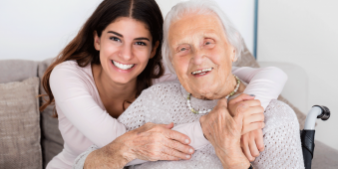Do Caregivers Improve the Health of Senior Adults?
Researchers at The University of Texas at Austin have found that senior adults who spend more time interacting with a wide range of people, including care givers, were more likely to be physically active and have better emotional health.
What is this new research?
This paper was published Feb. 20 in the Journals of Gerontology Series B: Psychological Sciences and Social Sciences. In this paper, researchers found that study participants who interacted more with family members and close friends, as well as acquaintances, casual friends, service providers and strangers were more likely to have higher levels of physical activity, less time spent sitting or lying around, greater positive moods and fewer negative feelings. It is the first study to link social engagement with physical activity throughout the day.
Ultimately, interacting with a wide range of people can help keep seniors more active and healthier longer. This includes acquaintances and non-family members including caregivers who work for home care agencies.
The research further reinforces the importance of social determinants of health including economic, social and environmental factors. As a result, these can influence whether a person becomes sick or needs medical care. There’s a growing push within the health care industry to address these non-medical factors early on. The hope is reducing spending on health problems down the road.
Why is this research important?
Studies have long shown that social engagement is good for your health, even linking loneliness to increased mortality.
The University of Texas at Austin study examined the effect social relationships have on physical activity and emotional well-being.
“Adults often grow less physically active and more sedentary as they age, and these behaviors pose a risk factor for disease and death,” said Karen Fingerman, a professor of human development and family sciences at UT Austin and the director of the university’s new Texas Aging & Longevity Center. “It is difficult to convince people to go to the gym or commit to work out on a regular basis. But they may be willing to reach out to acquaintances, attend an organized group event, or talk to the barista who serves them at their favorite coffee shop. Socializing in these contexts also can increase physical activity and diverse behaviors in ways that benefit health without necessarily working up a sweat.”
Fingerman’s research shows they do. Seniors who interacted with a range of diverse social partners were more physically active and reported feeling more positive moods.
What is the key?
The key to maximizing those social benefits lies in the variety of people seniors interacted with, the study showed. In other words, engaging with “weak” ties, or acquaintances, yielded the best results.
“Engagement with acquaintances made people more active than engagement with family or friends,” Fingerman, who is also the director of the University of Texas at Austin’s new Aging & Longevity Center, said. “We have long known the benefits of family and friends in old age. This study suggests acquaintances add something more and are beneficial for physical health and stimulation.”
“Older adults may be able to be more sedentary with their close friends and family by sitting and watching TV or otherwise lounging at home,” Fingerman said. “But to engage with acquaintances, older adults must leave the house, or at least get up out of their chair to answer the door.”
Therefore, the study further proves the importance of home care providers who offer services such as companion care or transportation services.
“All of these folks could be good for older adults’ well-being,” Fingerman said. “They are the type of ‘weak ties’ and acquaintances that help account for the findings.”
How we can help.
Canyon Lake Senior Home Care is a non-medical care provider serving the greater Canyon Lake region. Please let us know how we may assist you in your caring needs. Contact us today for a Complementary In-Home Consultation.








